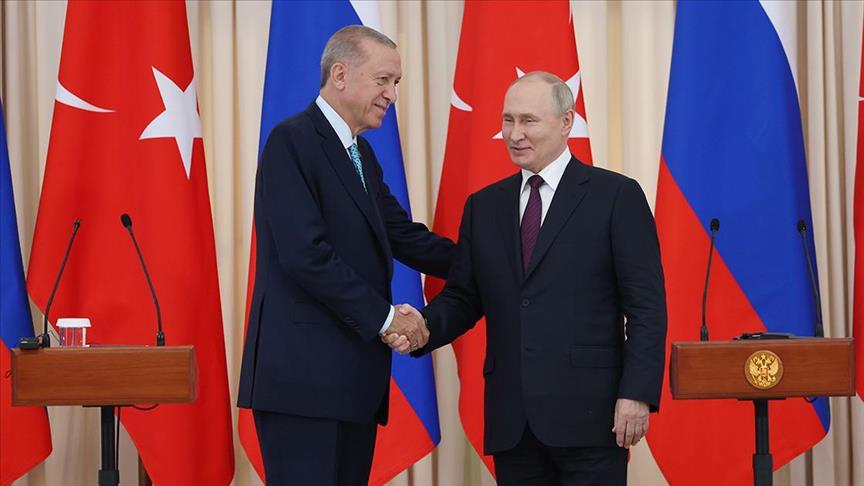

By Anadolu Agency
Türkiye’s efforts to become a natural gas hub resurfaced after Turkish and Russian leaders discussed the subject during their recent meeting in Russia’s city of Sochi on Monday.
Europe is heavily dependent on its most important energy source, natural gas, and particularly imports from Russia. Nonetheless, after the Russia-Ukraine war, the EU vowed to eliminate all Russian fossil-fuel imports by 2027.
Meanwhile, Türkiye is working to become a regional natural gas center, which would contribute to the security of its and Europe’s energy supplies.
These attempts advanced further when Russian President Vladimir Putin, during a meeting with his Turkish counterpart Recep Tayyip Erdogan in Sochi on Monday, referenced a road map between Russian energy company Gazprom and the Turkish Petroleum Pipeline Corporation BOTAS.
‘Gazprom handed over a draft roadmap for the implementation of a Turkish gas hub project to the BOTAS. The next move is the establishment of a joint working group,’ Putin said.
Erdogan, for his part, affirmed that further progress would be made in ‘both energy transmission and pricing’ once a natural gas hub is established.
He added that the establishment of such a hub in the Financial Center in Istanbul would be discussed with Russia later.
– Gas hub to encourage competitive pricing for European customers
Umud Shokri, a senior visiting fellow at George Mason University, commended the ‘significant changes’ in the plan to build a gas and energy center in Türkiye following the supporting words by Turkish and Russian officials.
Shokri said that more tangible steps are now expected, with Putin alluding to a draft roadmap between Gazprom and BOTAS.
The Washington-based energy strategist said ‘plans for enhancing Türkiye’s gas infrastructure, establishing long-term supply agreements, and perhaps permitting gas exports through Türkiye’ could be the next steps in this roadmap.
In addition, he said a working committee could be established to coordinate legal frameworks and supervise the roadmap’s implementation in keeping with the overall objective of improving energy cooperation, strengthening regional energy security, and establishing Türkiye as a prominent actor in the transit and distribution of natural gas.
To ensure a secure gas supply to Türkiye, Shokri advocated for negotiating long-term supply contracts and examining prospects for gas export to other nations.
The potential consequences of a planned gas hub project would strengthen ties between the EU and Turkey by assisting Europe in diversifying its energy sources, reducing reliance on a single, powerful provider like Russia, and increasing energy security.
‘A gas hub may also encourage competitive pricing, which might benefit European consumers by lowering gas prices and making gas more accessible,’ he said.
– Turkish Energy Exchange Istanbul offers best platform for gas trade
Oguzhan Akyener, the president of Türkiye’s Energy Strategy & Political Research Center (TESPAM), affirmed that although the specifics of the ongoing bilateral discussions cannot be openly discussed yet, he argued that the most logical step would be to sell Russian gas on the Energy Exchange Istanbul (EXIST) market.
According to Akyener, this platform should facilitate gas trade not only for Russian gas but also for Turkish gas discovered in the Black Sea.
‘Both Turkish companies and foreign companies should be able to trade on this platform,’ he said.
Russia and/or Türkiye are expected to make an announcement on gas sales prices in the near future, which would necessitate additional Russian supplies via pipelines for Türkiye to function as a gas hub.
‘After the commissioning of pipelines, how and under what conditions this gas will be sold to which countries in Europe, either by Türkiye or by Turkish investors, should be worked out,’ Akyener said.
– More natural gas deals with EU countries expected
Akyener anticipates further accords like the two recent major gas agreements Türkiye made with Hungary and Bulgaria.
On Aug. 21, Türkiye inked a natural gas export deal with Hungary, the first European country that is not one of Türkiye’s neighbors.
The agreement, which calls for the shipment of around 275 million cubic meters of natural gas through pipeline to Hungary to begin in 2024, was followed in January by another natural gas export agreement with Bulgaria.
The agreement envisions an annual export of 1.5 billion cubic meters of natural gas to Bulgaria.
We use cookies on our website to give you a better experience, improve performance, and for analytics. For more information, please see our Cookie Policy By clicking “Accept” you agree to our use of cookies.
Read More